As Nigeria faces rising food insecurity, degrading soils, and the growing threat of climate change, a fresh wave of sustainable agriculture is offering new hope for farmers.
Nestlé Nigeria, through its MAGGI brand, is leading this transformation with its Regenerative Agriculture (RegenAg) initiative—an ambitious project designed to boost crop yields, restore soil fertility, and build resilience among local farmers.
Launched in 2023, the RegenAg program brings together public and private partners including TechnoServe, IDH, and Ghana’s Centre for No-Till Agriculture. The pilot phase supported over 1,000 smallholder soybean farmers, providing them with training, improved seeds, and access to sustainable farming tools. Backed by an investment of more than ₦100 million, the initiative introduced eco-friendly techniques such as cover cropping, minimal tillage, crop rotation, and hedgerow planting—all proven methods to preserve soil nutrients, prevent erosion, and enhance long-term productivity.
According to Funmi Osineye, Category Manager for Culinary at Nestlé Nigeria, the initiative goes beyond sourcing ingredients for MAGGI. “Soybean is central to our product, but this project is really about creating a resilient food system. By training farmers especially women and youth—we’re ensuring better harvests today and healthier soils for the future,” she explained.
During a ceremony celebrating the pilot’s success, over 150 stakeholders from agriculture, business, and development sectors gathered to recognize farmers who excelled in adopting regenerative practices. One participant, Engineer Lawan Abdul, shared how his yields doubled after embracing the new methods. “Since I started applying the techniques from this project, my harvests have increased by 100%. It’s been life-changing,” he said.
Following these promising results, the program has expanded into a multi-partner initiative supported by AGRA (Alliance for a Green Revolution in Africa) and Nestlé. The next phase targets 25,000 farmers nationwide, aiming to produce 80,000 metric tonnes of soybeans and other grains annually through regenerative farming.
Alidu Amadu, Head of Agriculture Services for Nestlé Central and West Africa, emphasized that the project shows the power of collaboration. “When farmers, businesses, and partners work together, we can restore the land, strengthen food systems, and create lasting prosperity,” he noted.
This initiative aligns with Nigeria’s national drive for food security and Nestlé’s global goal to source 20% of key ingredients through regenerative methods by 2025 and 50% by 2030. Experts believe such programs could transform Nigeria’s agriculture, helping smallholders adapt to climate change while ensuring a sustainable food future.





